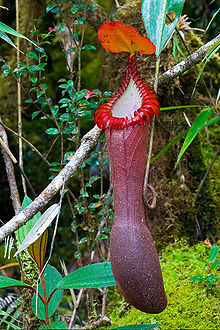Nepenthes edwardsiana
| Nepenthes edwardsiana | |
|---|---|
 |
|
| Upper pitcher of Nepenthes edwardsiana from Mount Tambuyukon | |
| Scientific classification | |
| Kingdom: | Plantae |
| (unranked): | Angiosperms |
| (unranked): | Eudicots |
| (unranked): | Core eudicots |
| Order: | Caryophyllales |
| Family: | Nepenthaceae |
| Genus: | Nepenthes |
| Species: | N. edwardsiana |
| Binomial name | |
|
Nepenthes edwardsiana H.Low ex Hook.f. (1859) |
|
| Synonyms | |
Nepenthes edwardsiana /nᵻˈpɛnθiːz ɛdˌwɔːrdziˈɑːnə/, or the Splendid Pitcher-Plant, is a carnivorous tropical pitcher plant endemic to Mount Kinabalu and neighbouring Mount Tambuyukon in Sabah, Malaysian Borneo. It is considered one of the most spectacular of all Nepenthes, producing some of the largest pitchers and the most highly developed peristome ribs of any species in the genus.
The type specimen of N. edwardsiana was collected on Mount Kinabalu in 1858 by a climbing team consisting of Hugh Low, Frederick William Burbidge, and Spenser St. John. Designated as Low s.n., the specimen is deposited at the Royal Botanic Gardens, Kew.
Nepenthes edwardsiana was formally described in 1859 by Joseph Dalton Hooker. Hooker named the species after George Edwardes, Governor of the Crown Colony of Labuan, at the request of his friend Hugh Low. Hooker's original description and illustration were reproduced in Spenser St. John's Life in the Forests of the Far East, published in 1862. St. John wrote the following account of N. edwardsiana on Mount Kinabalu:
...
Wikipedia

